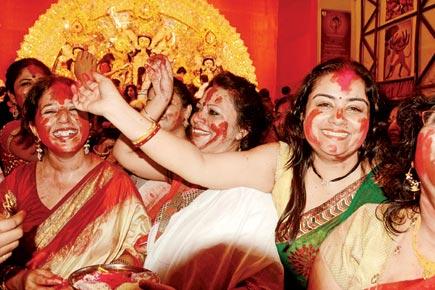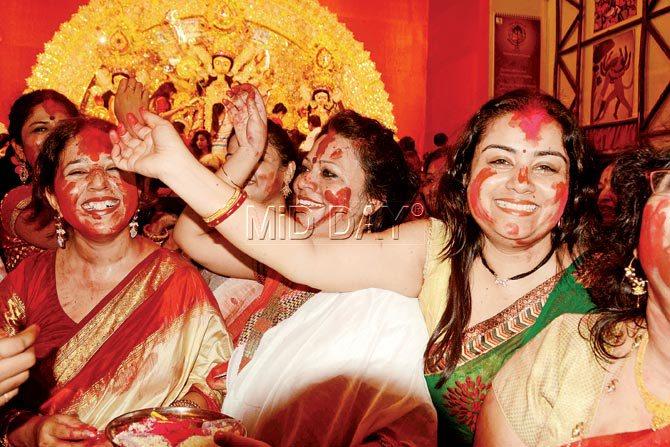Durga Puja is easily the biggest, or perhaps the only, truly community event of Bengalis both at home and abroad.

Durga Puja
 Durga Puja is easily the biggest, or perhaps the only, truly community event of Bengalis both at home and abroad. When I say home, I obviously refer to present day Bengal, but abroad does not necessarily mean foreign shores, although Durga now makes her annual trip to the world of the mortals by visiting cities around the globe.
Durga Puja is easily the biggest, or perhaps the only, truly community event of Bengalis both at home and abroad. When I say home, I obviously refer to present day Bengal, but abroad does not necessarily mean foreign shores, although Durga now makes her annual trip to the world of the mortals by visiting cities around the globe.
In this age of global citizens, gods and goddesses have adapted to what, till a few decades ago, were alien lands across seven seas. Almanacs transcend time zones and a five-day puja is suitably tailored to fit into a weekend without cutting corners, for Bengalis living in America and Europe.
ADVERTISEMENT

Festive spirit: Mumbai has a large, thriving Bengali community, evident from the number of community Durga Pujas organised in this city. Pic/Atul Kamble
My reference, however, was to ‘probashi’ Bengalis, or Bengalis living away from home in India. Bengalis were never eager migrants; rather than seize opportunities to seek fame and fortune elsewhere, they would stay at home, even shunning a move from one district to another within Bengal.
This possibly explains why dialect, diet and, at times, even dress varies from region to region in Bengal. Preference for a particular variety of daal, vegetable or fish, cooked in a certain manner, or the pronunciation of words and alphabets (for instance, ‘sh’ as ‘sa’), or the way in which women drape their saree or wear their dhuti (or dhoti) can tell those who know which district is a Bengali from.
The turbulent Sixties and the unsettling Seventies forced a change in the Bengali’s attitude towards migration. First there was a trickle, with the best and the brightest young men and women moving out of Bengal for higher studies; they never returned. That trickle soon turned into a tide as jobs disappeared and employment opportunities shrunk. Both white-collared professionals and blue-collared workers migrated and continue to migrate.
Among the cities that received Bengalis with open arms (implicit in this is the suggestion that not all were equally welcoming) was Mumbai. It has a large, thriving and well-integrated Probashi Bengali community, evident from the number of community Durga Pujas organised in this city.
The community Durga Puja, or barowari pujo, as it was known before it became the paara’r pujo, is of recent vintage. Earlier old families with zamindari or business roots would organise Durga Puja at their ancestral village or city mansion; local residents were invited.
Then, as the legend goes, 12 friends got together to organise the first barowari Durga Puja with community contributions. The evolution of the community Durga Puja, however, need not detain us. Suffice to say, it is now a cultural identity marker, more so for probashi Bengalis.
There was a time when many Bengalis would travel for a month’s vacation during the Durga Puja season, which would begin with Mahalaya (everybody would get up at the crack of dawn to listen to Birendra Krishna Bhadra’s Chandipath, broadcast live by All India Radio, huddled over chaa-biskut) and end with Bhai Phonta (or Bhai Dooj) two days after Kali Puja.
Bengalis of that generation had this craving for a “change of air and water”. Entire families — and those were days of huge joint families with widowed aunts and unemployed (mostly unemployable) cousins — would travel to Darbhanga and its adjacent places, others to Ranchi and Hazaribagh, where they either had a second home, relatives or rented a house.
Over the decades families have splintered, Bihar and Jharkhand (to a lesser extent) have become intolerant to ‘baharis’, and now young Bengalis travelling during this season go to exotic holiday destinations. They travel on aeroplanes and not by train. The mandatory felt-covered water bottle and large aluminium tiffin carrier are relics of the past.
Yet another tradition of the past that has bitten the dust is the community’s participation in cultural events during Durga Puja. The theatre club (every paara had one) would stage a play for which rehearsals would be held over several months. Those gifted with music would showcase their talent. There would be something for children too. Jatra, a popular theatre form, was a big thing. Utpal Dutt and Natya Company were much in demand.
Now all that has been outsourced to commercial performers and artistes. The bigger the name, the bigger the sponsor. Even the traditional bhog, comprising steaming khichuri, bhaja, paanch-mishali torkari, chaatni and paayesh (khichri, fritters, five-vegetable mish-mash, chutney and rice kheer) has made way to caterer-supplied meals that are eminently avoidable.
I am sure some places have stuck to tradition, but most have not. Times change, so do people, their lifestyles and preferences. My childhood memories of our community Durga Puja are still resplendent with the twin fragrances of Joba Kusum hair oil and Kanta scent mingling with the heady smell of frankincense. My children have never heard of either, leave alone seeing or smelling them.
Yet, for all the departures that have taken place, Durga Puja still retains its charms and in a certain way binds a community to a fast disappearing and, if I may add, diminishing cultural identity. We Bengalis should be thankful to the Goddess, who has left for her Himalayan abode after her all too short annual visit home, for small mercies.
The writer is a senior journalist based in the National Capital Region. His Twitter handle is @KanchanGupta
 Subscribe today by clicking the link and stay updated with the latest news!" Click here!
Subscribe today by clicking the link and stay updated with the latest news!" Click here!







